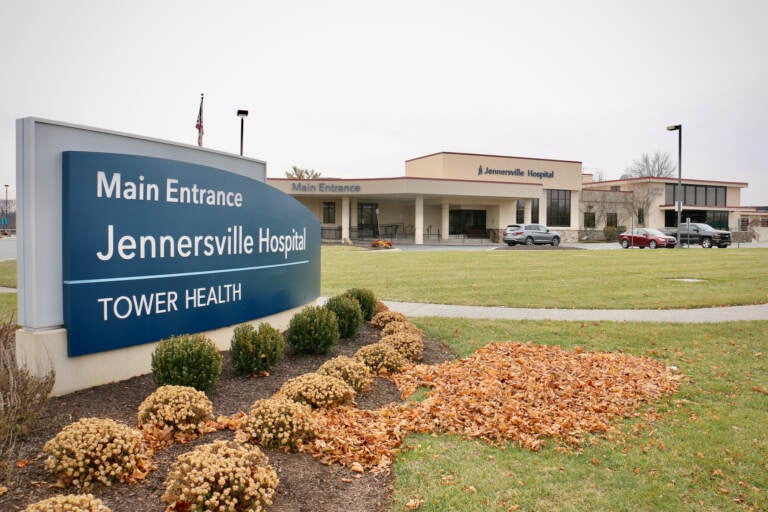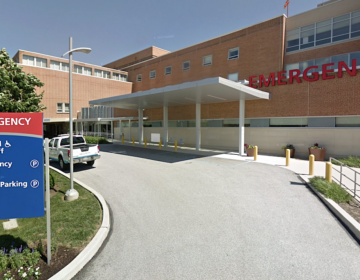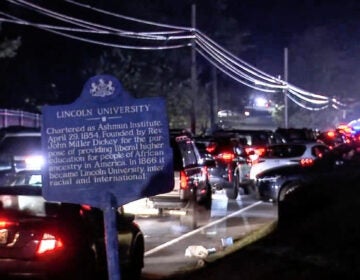ChristianaCare to acquire Jennersville Hospital from Tower Health
Chester County has been a health care desert since Tower Health made the decision to shutter Jennersville and Brandywine hospitals in December and January, respectively.

Jennersville Hospital in West Grove, Pa. (Emma Lee/WHYY)
Got a question about life in Philly’s suburbs? Our suburban reporters want to hear from you! Ask us a question or send an idea for a story you think we should cover.
Jennersville Hospital officially has a buyer. ChristianaCare will purchase the hospital in Chester County from Tower Health.
The newly acquired grounds will be called the ChristianaCare West Grove Campus. The deal is expected to close within the next 60 days. ChristianaCare announced on Wednesday that it will take over Tower Health’s interest in two office buildings, as well as a 24-acre parcel of land.
“At ChristianaCare, we recognize that the closing of Jennersville Hospital represented a loss of access to important health care services in the surrounding community,” said Dr. Janice E. Nevin, the nonprofit health care system’s president and CEO, in a press release.
Chester County has been a health care desert since Tower Health made the decision to shutter Jennersville and Brandywine hospitals in December and January, respectively, after a previous buyer failed to show that it was financially viable.
In March, ChristianaCare took over two primary care practices in Jennersville and West Grove that were previously affiliated with Tower Health. It appears that was a precursor to a new deal.
“We look forward to working with community leaders, listening and evaluating needs, and re-establishing the right mix of health care services at this location,” Nevin said.
When ChristianaCare West Grove Campus will open is unclear and planning for which services will be offered is still in the “early stages.” The Wilmington-based health care provider is still “exploring what is possible,” according to the press release.
“We know that the loss of the emergency services because of the closing of Jennersville Hospital is a significant concern of the community, and that’s definitely something that we’re discussing. Our priority right now is to talk with community leaders and listen to the community, so that we can develop a plan that meets their needs,” said Jennifer Schwartz, ChristianaCare’s chief strategy officer.
While talks are ‘ongoing,’ future of Brandywine and Crozer hospitals remains unclear
The Chester County community “desperately” needed this deal to happen, Commissioner Marian Moskowitz told WHYY News. Since the closures of Jennersville and Brandywine, the remaining suburban hospitals have been overwhelmed, and ambulance rides have been extended due to the strain on the system, she said.
“Having [Jennersville hospital] at the very southern part of our county will give such a relief to those communities around there,” Moskowitz said.
Moskowitz said the hospital reopening timeline will depend on factors such as licensing with the state and sourcing equipment.
As far as what will happen to the shuttered Brandywine Hospital, Moskowitz said that talks between Tower Health and unknown interested parties are “ongoing.”
“Brandywine is a bit more difficult a project for a lot of reasons, but I know that there are people interested in Brandywine and I know that there are talks ongoing so we can all keep our fingers crossed,” Moskowitz said.
It is unclear what effect, if any, the deal will have on ChristianaCare’s interest in acquiring Crozer Health — the struggling, four-hospital system in Delaware County — from Crozer parent company Prospect Medical Holdings. The health care system said in the press release that the due diligence process for the transaction is ongoing.
Acquiring Jennersville “makes sense” for ChristianaCare, one of the largest providers in the mid-Atlantic, according to Mark Richman, vice president of InnoVative Capital, LLC, based in Springfield. Richman’s company serves as a financial advisor for hospitals and other entities, like housing agencies and municipalities nationwide. He has been keeping a close eye on the hospital shakeups that have been happening in his backyard.
“[Christiana] wants to get market share in the Pennsylvania area. They have an outpatient center already in Chadds Ford,” Richman said. “I think it would be really good for the community.”
Richman said that as a nonprofit hospital system, ChristianaCare sees southeastern Pennsylvania as an area where it can make an impact — especially with the financial troubles facing some of the region’s other providers.
However, he was also surprised that ChristianaCare entered into this deal while it was already in talks with Prospect to acquire Crozer. Now, two transactions could potentially happen almost simultaneously.
While Richman said it’s hard to say whether or not ChristianaCare is still interested in Crozer, he is concerned that the health system may be “over-leveraging” itself, similar to when Tower Health acquired Jennersville and Brandywine in 2017 and 2018.
Pulling Crozer out of a financial hole while trying to reestablish Jennersville would be a “large task,” Richman said.
Longer-term solutions for Pa. hospital woes?
Pennsylvania is one of just 15 states nationwide that does not have state regulatory mechanisms for handling events like hospital acquisitions and closures.
In Rhode Island, for example, a strict regulatory setup allowed the state to save two Prospect-owned hospitals from financial vulnerability. Pennsylvania officials were warned about Prospect’s history of siphoning money out of its hospitals but had no power to act.
The kind of regulatory mechanism that saved Rhode Island hospitals could help to protect Pennsylvania hospitals from future closures, Richman said.
“Pennsylvania, I believe, needs to meet to start to develop a protocol to protect health care — and there is none,” Richman said. “The counties don’t know what to do when their hospitals are going under.”
The status quo hasn’t been enough to help the region’s health care system.
“That’s a lot of lost health care. That’s a lot of lost jobs,” he said. “That’s a lot of patients who need help — and it only overcrowded other hospitals and caused a squeeze on resources.”

Get daily updates from WHYY News!
WHYY is your source for fact-based, in-depth journalism and information. As a nonprofit organization, we rely on financial support from readers like you. Please give today.







